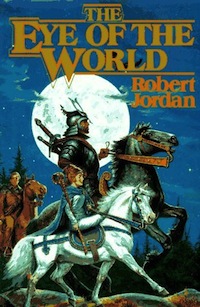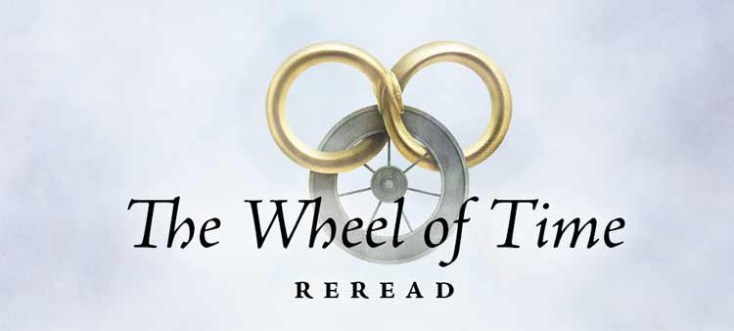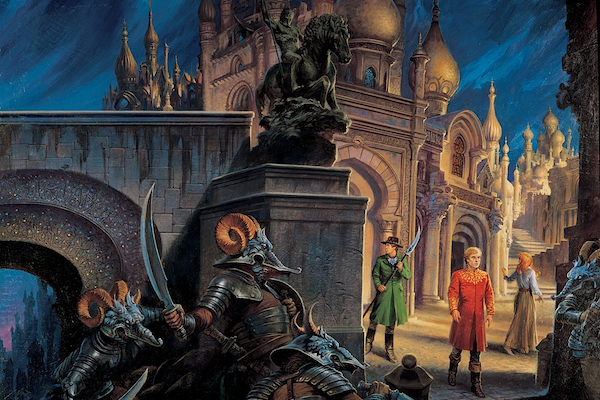Greetings, my peoples! Welcome back to the Wheel of Time Reread Redux!
Today’s Redux post will cover the (official) Prologue of The Eye of the World, originally reread in this post.
All original posts are listed in The Wheel of Time Reread Index here, and all Redux posts will also be archived there as well. (The Wheel of Time Master Index, as always, is here, which has links to news, reviews, interviews, and all manner of information about the Wheel of Time in general on Tor.com.)
opens in a new window![]() The Wheel of Time reread is also now available as an ebook series, except for the portion covering A Memory of Light, which should become available soon.
The Wheel of Time reread is also now available as an ebook series, except for the portion covering A Memory of Light, which should become available soon.
All Reread Redux posts will contain spoilers for the entire Wheel of Time series, so if you haven’t read, read at your own risk.
And now, the post!
 Prologue: Dragonmount
Prologue: Dragonmount
Redux Commentary
Okay, first of all I have to just laugh and laugh at the entire original post, because OH MY GOD I COVERED NINE CHAPTERS IN ONE POST, THAT IS INSANE. The summaries are so wee! And so are the commentaries! Aw!
…Wow, I am totally cooing over my baby blogger pictures. So to speak. That’s weird, I think. Is that weird?
Well, whatever, it’s not like I ever claimed to be normal.
But yeah, I was definitely restraining myself in these early posts, knowing the amount of material that, at the time, I thought I only had nine months to get through. I am duly impressed at my lack of verbosity, but don’t worry, the intervening years have completely cured that tendency.
Anyway, the Prologue! My original comment on it, which was that this Prologue was one of the only “true” Prologues in the series, still holds (though you can make a case that the Prologue of TGH also counts). I suppose that is only fitting, though, since this is really a prologue to the entire series, as opposed to being a prologue for one particular book.
Which also makes it fitting that it was, again, the only time we “see” the Age of Legends in the series proper directly, as opposed to in magical flashback (as in Rand’s trip through the Wayback Ter’Angreal in TSR) or in historical accounts (as in “The Strike at Shayol Ghul” or various “history” snippets or, I suppose, whenever the Forsaken or, later, Rand happened to talk about what had happened there).
I also note that the two “historical” passages that end the Prologue here were used again in A Memory of Light:
And the Shadow fell upon the Land, and the World was riven stone from stone. The oceans fled, and the mountains were swallowed up, and the nations were scattered to the eight corners of the World. The moon was as blood, and the sun was as ashes. The seas boiled, and the living envied the dead. All was shattered, and all but memory lost, and one memory above all others, of him who brought the Shadow and the Breaking of the World. And him they named Dragon.
—from Aleth nin Taerin alta Camora,
The Breaking of the World.
Author unknown, the Fourth Age
And it came to pass in those days, as it had come before and would come again, that the Dark lay heavy on the land and weighed down the hearts of men, and the green things failed, and hope died. And men cried out to the Creator, saying, O Light of the Heavens, Light of the World, let the Promised One be born of the mountain, according to the prophecies, as he was in ages past and will be in ages to come. Let the Prince of the Morning sing to the land that green things will grow and the valleys give forth lambs. Let the arm of the Lord of the Dawn shelter us from the Dark, and the great sword of justice defend us. Let the Dragon ride again on the winds of time.
—from Charal Drianaan to Calamon,
The Cycle of the Dragon.
Author unknown, the Fourth Age
The first, which emphasizes the destruction and bad things and general apocalypticness the Dragon had brought (and/or would bring) is at the beginning of AMOL, and the second, which presented (at the time of TEOTW) a completely contradictory picture of his role as the savior of the world, is at the end. When I first read them in AMOL I think I was slightly annoyed that we were getting recycled “historical” passages instead of new ones, but I don’t think at the time that I remembered where they were originally placed. But now, seeing that they were actually the first two such passages we ever read in the series, I see why they were used that way, and I like it much better. Circling back around to the beginning, like everything else. Nice.
And the dichotomy between the two still applied, as well, since at the beginning of AMOL we technically still didn’t know whether Rand was going to destroy the world or save it (though realistically we totally did know, but anyway), and then at the end, obviously, we did. So AMOL was finally placing them in their proper context in terms of what part of the story they were talking about. I appreciate that now.
I also made a comment in the original post about liking Jordan’s penchant for “writing prose that should sound purple and overwrought, but doesn’t,” which is rather interesting in retrospect, because several years after that post I had a conversation with someone, who happens to be a respected SF writer, who told me that he never got into WOT precisely because of the “purpleness” of the Prologue’s prose, which put him off.
Rereading the Prologue now, I have to admit that the prose is, indeed, very purple, possibly excessively so, but I do think it is a shame that the writer in question evidently never read beyond that point, so as to see how the tone of the writing changed and, er, depurpled, so to speak, once it moved into the main narrative of the “present” day. To see that, in other words, the florid style of the Prologue was a deliberate choice on Jordan’s part, to differentiate it from the rest of the story in narrative style as well as in timeframe, and not an indication of the way the entire series would progress.
Because admittedly, I would probably not care to read an entire multi-book series in that style either, at least not these days. Tolkien could get away with it because he was fuckin’ Tolkien, okay, but very few others can do it and hold my attention anymore, especially as my love for language play and slang and colloquialisms has grown over the years. Thom Merrilin may decry the decline of High Chant ballads, and he probably has a point, but for my money, a good old-fashioned hootenanny in Common Tongue is much more likely to be my speed.
Still, that said, I think that the high-falutin’-ness of the language in the Prologue worked very well to convey the sense of history and weightiness that Jordan was attempting to evoke there, and I would not have changed it even if that would have been possible. Which, obviously, it is not.
As to the actual content of the Prologue, it’s sort of weird how little I find I have to say about it, because at this point I have so internalized the story of Lews Therin Telamon and what he did that I can’t even really summon a visceral response to it anymore. Even though I know that on first reading I must have had one, especially to the revelation that Lews Therin had unknowingly slaughtered his entire family. But by now it’s sort of like seeing Bruce Wayne’s parents get murdered; it’s objectively horrible, but by now the story is so well-known, to me anyway, that it’s hard to generate an emotion stronger than a solemn acknowledgment of its horribleness. Maybe that makes me a bad person, but I suspect it probably just makes me a human one. Perhaps I will have more to say about it later.
Lastly, I made a comment in the original post about how we never found out what “the Nine Rods of Dominion” that Ishamael makes reference to here were, and was swiftly corrected in the comments that Jordan later made statements to the effect that they were not in fact objects, but instead offices, i.e. people, probably high-ranking governors of some kind. So it was never clarified in the canon, but was by the author in outside commentary, which indicates it was just a minor world-building thing and never anything of particular importance beyond that. Though I do also think (and other people have speculated, I believe) that it was an oblique reference to the Nine Rings in Tolkien’s LOTR books, one of many such references/homages that TEOTW made to that worthy progenitor of the epic fantasy genre.
But we will get to that more in due time, as we move on to the main narrative of the series.
Which will be next time, Gadget, next time! I don’t think I will always be moving this slow with the Redux Reread, but things are still fairly unsettled on the Auntie Leigh homefront, so we will be stopping here for now. As a side note on that topic, I wish to extend my thanks and appreciation to everyone on Tor.com and elsewhere who offered me condolences and support on my recent loss, because y’all are the best and I will fight anyone who says different. Cheers, and I’ll see you next Tuesday!












